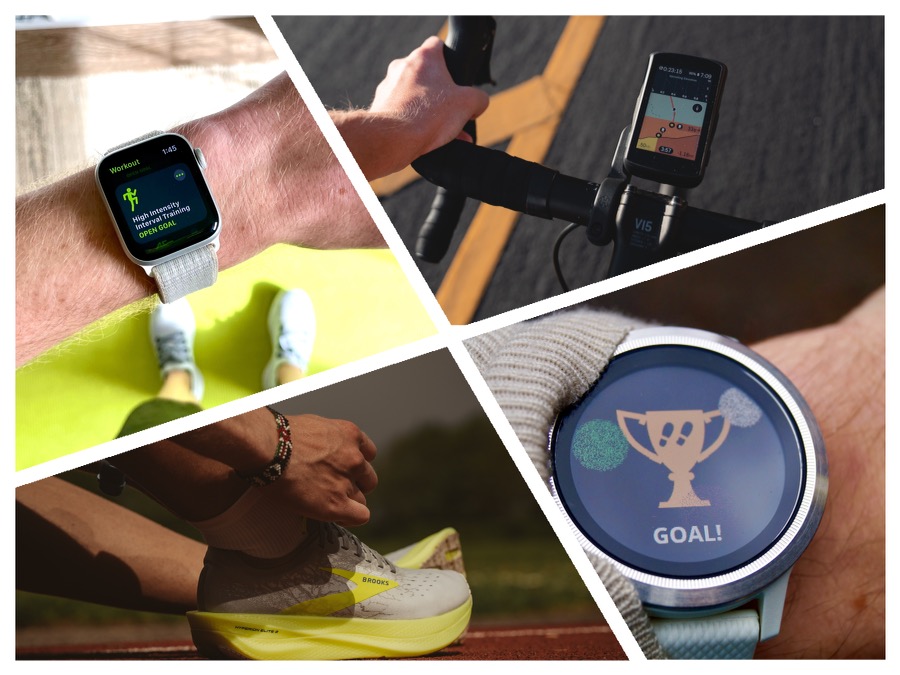Psychology of Endurance Sports Training Technology

Let me first say that I love technology. I like various forms of endurance sports training technology including my Garmin watch and carbon-plated shoes. However, I have also noticed my mental health take a hit. This comes in the form of my ability to track every mile, minute of sleep, and share with friends. Other forms are when I compare my latest workout times to my workout last week. Never mind when I bemoan my “non-recovered” sleep score after being up multiple times through the night with my baby. As I write all that I can almost feel a little bit more fun being sucked out of running.
From smartwatches to heartrate monitors to ring and wrist wearables there is no shortage of ways to track your fitness. Now layer that with some carbon-plated super shoes, recovery boots, form goggles, and Zwift. The technology that was once available to only professionals has now become more accessible to the general population.
In a world that seems to endlessly be pumping out the newest technology to help you train harder, perform better, and recover faster; it can be hard to distinguish what is actually helpful from what is just a cool piece of technology. One way to look at the influence of technology is through metrics. At any given time countless research studies are being conducted on their effectiveness. Personally, I’ve found some of the super shoe studies conducted to be some of the most intriguing. In the ever-so-famous debate fashion of body or mind, the other way to view technology is through a psychological lens.
While the metrics are intriguing I’ve found the psychological impact on athletes to be, in my opinion, a bigger factor in determining the effectiveness of the technology. From confidence to self-doubt to data overload, to actionable feedback, training technology at times seems to provide more mental training and awareness than actual workouts. Learning to be aware of your unique psychology and how it interacts with technology is crucial to using endurance sports training technology. You want the technology to elevate your performance instead of undermining it.
Technology is Cool
Fitness trackers have revolutionized our ability to understand what our body is doing. The daily feedback can help you see patterns and trends that you might otherwise be unaware of. This can be useful in creating accountability and bridging the gap between knowing and understanding their impact on our body. Sleep, or lack of, as a data point is one of those things that we want to understand more about. For many, just wearing a tracker provides motivation to train, rest, and take care of their body. The insights that can be gained from trackers are perhaps their biggest draw. Our minds love to have quantifiable data because it is easier to process and make an action plan.
Besides wearables, there is no shortage of gear that promises to make you faster and recover quicker. A lot of studies on this gear back up their claims. This can instantly add a boost of confidence to your workout. I’m pretty certain that people get faster just looking at the Nike Alphafly’s because they believe in the technology. Take that belief and partner it with technology. A result will be achieving wildly cool things in part because of a developed belief in ability. This can be because you have that particular piece of gear. The same applies to recovery technology. Part of the magic is the belief that it will actually help you recover faster. Your brain and body adapt to the narratives you tell it. If technology helps you believe you are capable then it’s totally worth the investment!
Downfalls
Technology has created more insecurity, fear, anxiety, obsessive, and dependent behaviors in athletes. The constant data feedback can be tough on your psyche. Instead of listening to your body and drawing conclusions based on how you feel and your perception, you are adding a quantifiable variable that you have naturally attached value to. XX- means you are doing well while XX means you are doing poorly. When we trigger the narrative that we are doing poorly we are more likely to continue to play out that narrative. We are doing this instead of correcting or writing a more positive narrative.
The beliefs we attach to metrics can undermine our ability to perform. How does this happen? This occurs because we are not getting the feedback that we have determined to be necessary to reach our goals. We even see this manifest in athletes limiting their potential because they don’t have access to a certain technology. For example, “I don’t have form goggles to practice with so I will never be that good of a swimmer.”
An Experiment
Being aware of our thoughts, beliefs, feelings, and behaviors that are connected devices is important. Those reactions can be to both use and non-use of technology. A good place to start is with a two-week experiment. The first week use all the technology you normally would. Keep a training journal that includes both quantitative and qualitative data. Take note of patterns of thoughts, beliefs, feelings, and behaviors.
The next week abstain from some or all of your endurance sports training technology. Again, keep a training journal of data this time more focused on the qualitative data and take note of patterns. Finally, compare the two and look for similarities and differences in patterns. Based on the data gathered consider making adjustments to your technology use and consumption. Examples of tweaks to data use could be looking at it once a month or removing some metrics. You can also do your workouts without fancy gear.
Getting curious about technology and its impact on your psychology is critical. You want to make sure you’re helping your performance and not hurting it. Be aware of how technology is helping you and pivot away from the areas that it is hindering your growth. Remember that the best athletes are the happiest athletes so choose technologies that make you a happier athlete!

Haleigh Fisher is a Licensed Professional Counselor working with athletes to help them train and live happy by helping them develop mental skills and embrace their strengths. She is a former Division I cross country athlete turned trail runner and uses her experience as a competitive athlete and mental health clinician to connect with clients and help them unlock their potential. Haleigh describes herself as a joy seeker, a trail running adventurer, a celebrator of food, an artist, and a lover of people; thrift shopping; and cupcakes.








